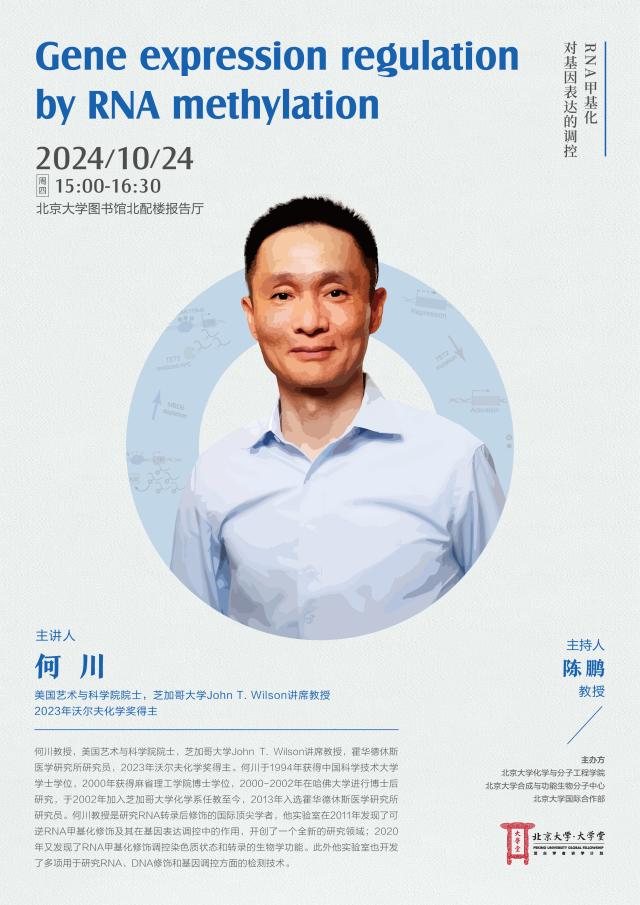
报告人简介
何川教授
美国艺术与科学院院士,芝加哥大学John T. Wilson讲席教授,霍华德休斯医学研究所研究员,2023年沃尔夫化学奖得主。何川于1994年获得中国科学技术大学学士学位,2000年获得麻省理工学院博士学位,2000-2002年在哈佛大学进行博士后研究,于2002年加入芝加哥大学化学系任教至今,2013年入选霍华德休斯医学研究所研究员。何川教授是研究RNA转录后修饰的国际顶尖学者,他的实验室在2011年发现了可逆RNA甲基化修饰及其在基因表达调控中的作用,开创了一个全新的研究领域;2020年又发现了RNA甲基化修饰调控染色质状态和转录的生物学功能。此外他的实验室也开发了多项用于研究RNA、DNA修饰和基因调控方面的检测技术。
Dr. He is the John T. Wilson Distinguished Service Professor in the Department of Chemistry and Department of Biochemistry and Molecular Biology at the University of Chicago. He received his bachelor of science degree in 1994 from the University of Science and Technology of China and his Ph.D. in chemistry from the Massachusetts Institute of Technology in 2000, studying under professor Stephen J. Lippard. After training as a Damon-Runyon postdoctoral fellow with professor Gregory L. Verdine at Harvard University, he joined the University of Chicago as an assistant professor, rising to associate professor in 2008 and full professor in 2010. He was selected as an investigator of the Howard Hughes Medical Institute in 2013. Dr. He’s research spans a broad range of fields including chemical biology, RNA biology, epigenetics, biochemistry, and genomics. His recent research concerns reversible RNA and DNA methylation in biological regulation. In 2011, his group discovered reversible RNA methylation as a new mechanism of gene expression regulation. His laboratory characterized the RNA m6A methyltransferase complex and several key reader proteins that bind preferentially to m6A-modified RNA and regulate their stability and translation. In 2020, Dr. He’s laboratory reported prevalent m6A methylation on chromatin-associated regulatory RNAs (carRNAs), which regulates chromatin state and global transcription. The reversible methylation of carRNA controls mammalian and plant development. His laboratory also spearheaded the development of enabling technologies to study RNA and DNA modifications as well as gene expression regulation.
报告摘要
Over 150 types of post-transcriptional RNA modifications have been identified in all kingdoms of life. We have discovered RNA demethylation and shown that reversible RNA modification could impact a wide range of biological processes. We have also characterized proteins that selectively recognize m6A-modified mRNA and affect the translation status and lifetime of the target RNA. I will present our recent discoveries on chromatin state regulation by chromatin-associated regulatory RNA (carRNA) methylation. We found that carRNAs contain different chemical marks which facilitate recruitment of chromatin factors to shape local and global chromatin state. Some of these carRNA methylation-dependent pathways explain oncogenic roles of well-known oncogenes, which provides potential new targets for future anti-cancer therapies.